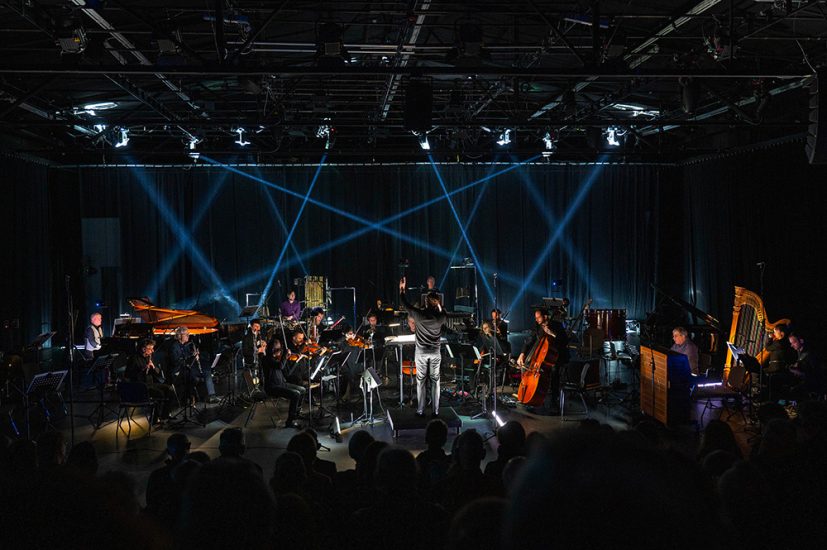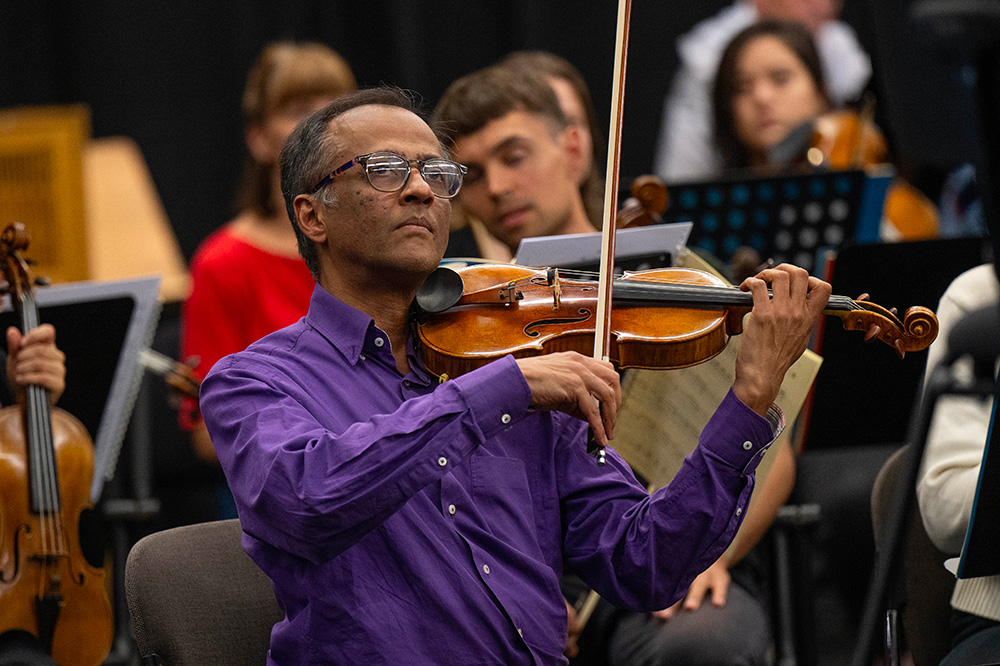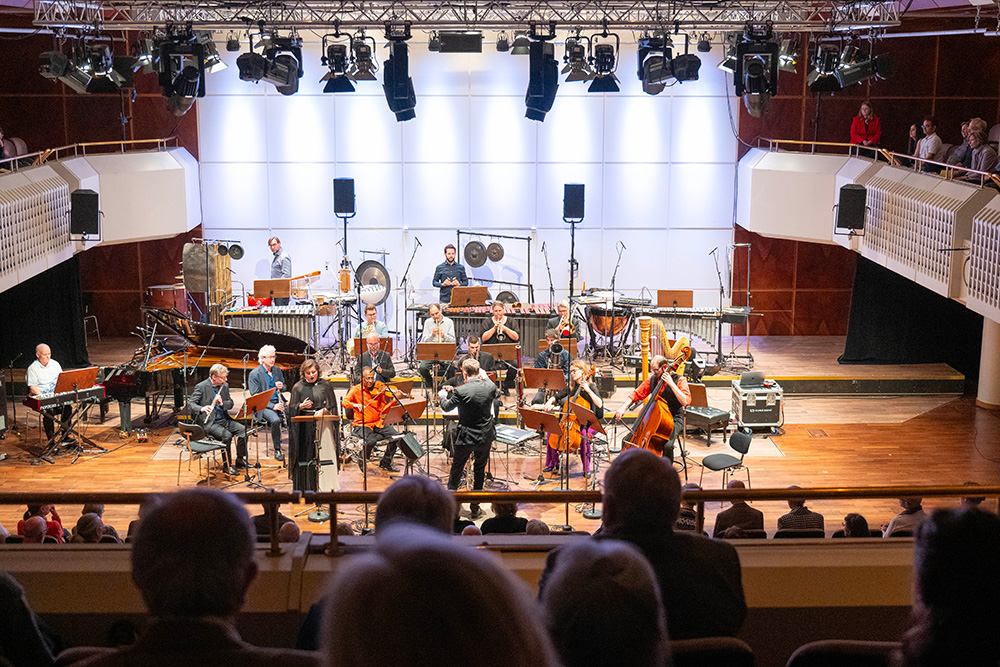Ensemble Modern I
The concert is financially supported by the Deutsch-tschechischer Zukunftsfond.
Programme
- Unsuk Chin: Fantaisie mécanique
- Haštal Hapka: A Lay in the Dive (world premiere)
- Jan Ryant Dřízal: Morphing Amadeus (world premiere)
- Barbora Tomášková: Pulsum Noctis (world premiere)
- Pavel Šabacký: Awakening (world premiere)
- George Benjamin: At first light
Performers
- Ensemble Modern
- Michael Wendeberg – conductor
In 2025 Ensemble Modern will be launching their three-year residency at Prague Offspring. The leading contemporary music ensemble will travel to Prague to perform premieres of pieces by Czech and Slovak composers, music by established world composers, and key works by the festival’s Composer-in-Residence, Sir George Benjamin, whom The Guardian described as “one of the doyens of contemporary British composition, whose music makes sounds of ravishing, shimmering beauty”.
The first concert will open with Fantaisie mécanique, which South Korean composer Unsuk Chin (*1961) wrote as a commission from the French Ensemble intercontemporain. “As the title suggests, the piece is a union of two contradictory concepts: improvisation and predetermined structure,” says Unsuk Chin, a pupil of György Ligeti and holder of numerous distinctions for contemporary composition, including two of the most coveted: the Grawemeyer Award and the Ernst von Siemens Music Prize. “Whilst giving the illusion of free expression, the work actually adheres to the strictest virtuosity and ensemble playing of the performers.”

This 15-minute composition will be followed by four world premieres. Haštal Hapka (*1997) was commissioned to write a new work as the winner of last year’s Reading Lessons, which is an integral part of Prague Offspring, and it was here that members of Klangforum Wien performed his piece Three rivers ashes. Jan Ryant Dřízal (*1986) is a highly distinctive composer of his generation. His music has been performed by the Czech Philharmonic, the Prague Radio Symphony Orchestra and the Prague Symphony Orchestra. Slovak composer Barbora Tomášková (*1990) studied in Bratislava and in the Portuguese city of Porto. In her composition work she makes use of electronics, Duchampesque “found objects” and various sound objects which she designs herself. The last of the four, composer Pavel Šabacký (*1995), might conceivably be called a child of Prague Offspring. When this Prague Spring contemporary music format was held for the first time in 2022, he was still a student at Brno’s Janáček Academy of Performing Arts when he won the Reading Lessons workshop; as a result he received a commission to write a short piece which Klangforum Wien performed the following year. He is currently writing a more extensive composition for Ensemble Modern.

The first evening featuring Ensemble Modern will end with the piece At First Light. Composer-in-Residence Sir George Benjamin wrote it when he was only twenty-two, inspired by the painting Norham Castle, Sunrise by English Romantic painter and precursor of Impressionism, William Turner. “The 12th century castle in this picture is silhouetted against a huge, golden sun. What struck me immediately about this beautiful image was the way in which solid objects – fields, cows and the castle itself – virtually appear to have melted under the intense sunlight,” wrote Benjamin. “It is as if the paint were still wet. Abstractly, this observation has been important to the way I have composed the piece. A ‘solid object’ can be formed as a punctuated, clearly defined musical phrase. This can be ‘melted’ into a flowing, nebulous continuum of sound.” The premiere of the work was performed in 1982 by the London Sinfonietta, conducted by the then 27-year-old Simon Rattle.

The concert will be conducted by Michael Wendeberg, a regular partner of Ensemble Modern, who feels at home both in the classical repertoire and in contemporary music. Wendeberg has worked with distinguished world orchestras and ensembles focusing on contemporary music, such as the SWR and WDR Symphony Orchestras, the Mahler Chamber Orchestra and Klangforum Wien, or the Birmingham Contemporary Music Group. As a pianist he was a member of Ensemble intercontemporain in the years 2000–2005, where he collaborated closely with György Kurtág and Pierre Boulez. In Berlin’s Pierre Boulez Saal he performed Boulez’s complete piano oeuvre, which he subsequently also released on CD.
Ensemble Modern has been defining trends on the contemporary music scene for decades now. The British newspaper The Guardian described them as “Frankfurt-based musicians, who for their versatility and virtuosity have few peers among Europe’s specialist contemporary music groups”. The ensemble was founded in Frankfurt in 1980; today its core consists of eighteen soloists from Belgium, Bulgaria, Germany, Greece, India, Japan, Switzerland and the USA. Each year members of the ensemble study around seventy new works, approximately twenty of which will then be given their world premieres. Typically open to all manner of genres, Ensemble Modern also includes in its programmes music theatre productions, dance performances and multimedia projects. With an extended players’ list the ensemble’s members also perform symphonic works under the name Ensemble Modern Orchestra. Over the decades since they were established they have cultivated close relationships with leading contemporary composers, among them Unsuk Chin, Olga Neuwirth, Heiner Goebbels, Helmut Lachenmann, Karlheinz Stockhausen, Wolfgang Rihm and Steve Reich. Their recordings of these composers’ works, which Ensemble Modern also releases on its own label, are considered referential. In addition to concerts presented as part of its own subscription series at Frankfurt’s Alte Oper, the ensemble is a regular guest at prestigious festivals and concert venues, including Festival d’Aix-en-Provence, Berliner Festspiele, Holland Festival, London’s Wigmore Hall and South Bank Centre and New York’s Carnegie Hall. In 2003 they launched the International Ensemble Modern Academy, which provides opportunities for all kinds of educational projects, with the aim of sharing and mediating the latest artistic movements in various formats. The Academy offers, for instance, a master’s programme in contemporary music performance at the Hochschule für Musik und Darstellende Kunst in Frankfurt, international composers’ and conductors’ seminars, and educational projects for children and teenagers.








